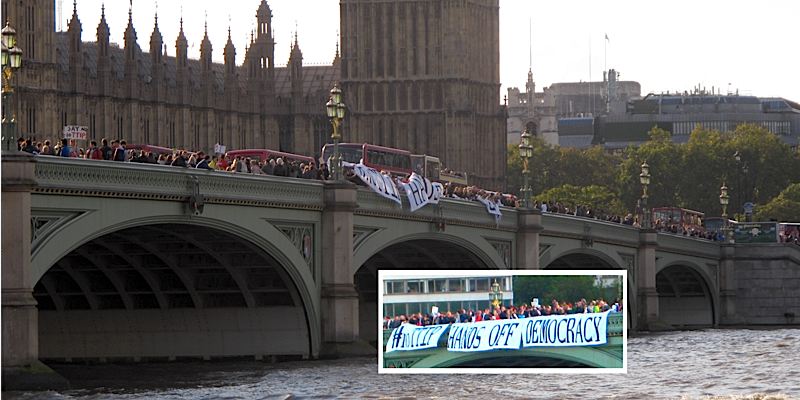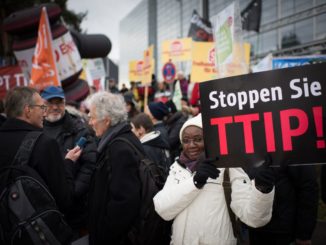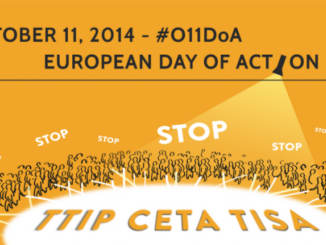Over 400 activist groups met, demonstrated and marched across Europe on Saturday, October 11 in protest the current rhetoric of the Transatlantic Trade and Investment Partnership (TTIP) and explore viable alternatives to EU-US trade deal.
This is the first time that so many have been mobilized against free trade agreements in Europe. Over 1100 actions and events took place in 22 European countries highlighting issues from TTIPs impact on local decision making processes in Germany, to how it will affect health care provision in the UK to GMO food and feed in France.
Although the issues put forward and discussed at these events varied from country to country and at local actions. They put a common message forward to our decision makers in both the EU and US. TTIP will have a big impact on citizens and society and citizens want to be involved in the discussions, and don’t want to have to guess what goes on behind the closed doors of the talks on TTIP.

| #noTTIP message for UK parliamentPeter Crosskey writes from central London: Hundreds of protesters gathered in London on October 11 to oppose TTIP. They carried their #noTTIP message loudand clear from Parliament Square to nearby Westminster bridge, where their banners were hung from the parapet to spell out: “#noTTIP Hands off democracy.” The London action was one of a number taking place across the country, reflecting the widespread concerns over the secret talks which are being passed off as a “trade deal”. |
Actions brought together people from different backgrounds and disciplines to discuss what TTIP will mean for citizens and society.
One of the actions organized in Dublin, brought together activists and academics from a wide range of backgrounds. ATTAC Co-facilitator of Dublin’s Day of Action Event, Barry Finnegan from ATTAC Ireland, said that, “getting that mix of agriculture experts along with trade union organisers, as well representatives from development, global justice and environmental civil society groups makes citizen’s resistance to the TTIP not only well-informed, but energised and effective.
At this event ARCs, Dr Oliver Moore told the groups of the potential threats to food and farming and gave attendees a solid grasp of the negative implications of TTIP for the livelihoods of the entire Irish farming community. And showed people the horrific implications of TTIP. Forcing through antibiotic-laced meat products on to our shops, dismantling progressive elements of the CAP, and bringing banned chemicals such as paraquat, chlorine, and ractopamine hydrochloride into our food chain. Dr Moore also demonstrated how small and media farm-friendly, environmentally sustainable governmental agricultural policies will be practically impossible to maintain should the ISDS private corporate court system be adopted by the Commission as envisaged under TTIP.
“The resistance is now fertile here in Ireland!” said Barry Finegan.
See also:





